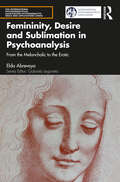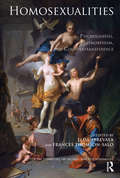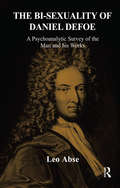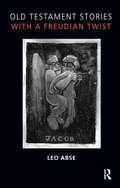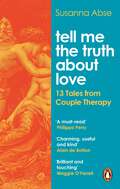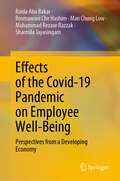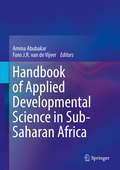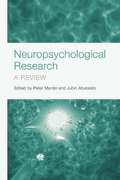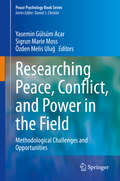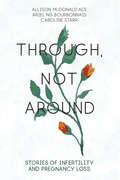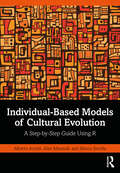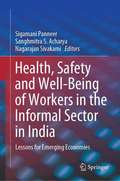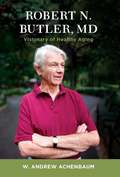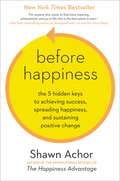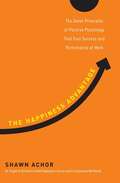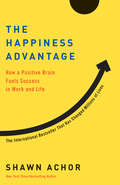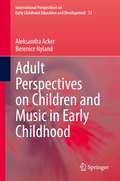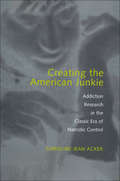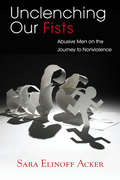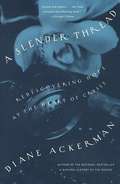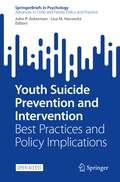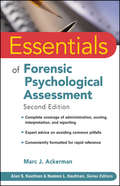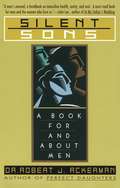- Table View
- List View
Femininity, Desire and Sublimation in Psychoanalysis: From the Melancholic to the Erotic (The International Psychoanalytical Association Psychoanalytic Ideas and Applications Series)
by Elda AbrevayaFemininity, Desire and Sublimation in Psychoanalysis explores female subjectivity and examines the complexities inherent in psychoanalytic work realized by women analysts with women. The book includes a critical study of psychoanalytic theories on femininity as well as a reflection on social aspects of gender. Elda Abrevaya envisages different paths to femininity, illustrated in the text with studies of Virginia Woolf and Marguerite Duras, and examines the vicissitudes of the relation of the little girl with the mother, and her crucial challenge, which is separation from the mother, in order to access erotic life and the use of cultural objects. Femininity, Desire and Sublimation in Psychoanalysis also explores the question of sublimation, shedding light on a field that has not been sufficiently explored in terms of female sexuality and female identity. Throughout the book, sublimation in women comes to the forefront as a source of satisfaction, liberation and participation in public life. The book will be important reading for psychoanalysts and other clinicians in the field of mental health as well as academics in the fields of gender studies, literature, philosophy and sociology.
Homosexualities: Psychogenesis, Polymorphism, and Countertransference (Psychoanalysis and Women Series)
by Elda AbrevayaThis latest volume in the Psychoanalysis and Women Series for the Committee on Women and Psychoanalysis of the International Psychoanalytical Association presents and discusses theoretical and clinical work from a number of authors worldwide. It clearly demonstrates that there is no typical development of homosexuality and that each individual's object-choice can only be grasped by examining their psychic history. While the therapeutic work requires no special adaptation of technique, countertransferential difficulties which may arise and stem in part from cultural representations about gender differences are fully explored. The book includes a unique retrospective view by Ralph Roughton over three time points which charts changes in considering the analyst's response within the wider cultural context.
The Bi-sexuality of Daniel Defoe: A Psychoanalytic Survey of the Man and His Works
by Leo AbseThis book presents an intriguing and novel Freudian overview of all Daniel Defoe's major works by confronting various psychoanalytic hypotheses regarding Defoe. It is an original, well-documented, and compelling cross-disciplinary approach to identity issues and creative genius of Defoe.
Old Testament Stories with a Freudian Twist
by Leo AbseThis collection of the author's last essays are writings that he was working on from 2006 up to and during his final illness. They take as their starting point stories from the Old Testament. For the author, the Bible provided a great inspiration for analysis, reflection, and speculation. His own distinctive voice is evident in every essay. Chapters include: Jubal: A discursive meditation on music and its origins; Jacob's wrestling match; The judgment of Solomon; Abishag: The lure of incest; and The nakedness of Noah.
Tell Me the Truth About Love: 13 Tales from Couple Therapy
by Susanna Abse'Brilliant and touching' Maggie O'Farrell'A must-read for everyone wanting to understand more about what makes us fall in - and out - of love' Philippa Perry'A charming, useful, kind book about the pains and hopes of relationships' Alain de BottonDrawing on over 30 years of therapeutic encounters with people facing hurdles in their love lives, former Chair of the British Psychoanalytic Council Susanna Abse takes us deep inside one of the most fascinating realms there is: other people's relationships.Candid and captivating, each chapter is inspired by a classic, timeless story. Parents blow their straw house down; Rapunzel yearns for companionship but remains trapped in her castle. Couples strive to navigate the fall from Eden, the bitter taste of the poison apple and strangers in their beds.From dealing with infidelity to navigating our changing role within a single relationship over the course of a lifetime, Tell Me the Truth About Love sheds vivid light on the human heart, and its struggle to both embrace life's greatest gift and protect itself from pain. Inside, you will find solace, wisdom and unparalleled insight into how, and why, we love.
Effects of the Covid-19 Pandemic on Employee Well-Being: Perspectives from a Developing Economy
by Raida Abu Bakar Rosmawani Che Hashim Man Chung Low Mohammad Rezaur Razzak Sharmila JayasingamThis book contributes toward the understanding of the human experience at work during the pandemic and its implications on employee well-being in the context of Malaysia, a developing economy with its own set of unique challenges. Very little research has been done about this issue to date, particularly in Malaysia. This book aims to bridge this gap by examining the Malaysian perspective of the concept of employee well-being in detail with the overarching goal of serving as a guide toward overcoming the challenges wrought on by the ever-changing post-pandemic environment. Different conditions and experiences are discussed to contextualize the unique ways in which individuals react to difficulties with an emphasis on how organizations can assist at a micro-level to allow employees to overcome such difficulties.
Handbook of Applied Developmental Science in Sub-Saharan Africa
by Amina Abubakar Fons J.R. van de VijverThis handbook collates research evidence and presents the most up-to-date findings on child development in Sub-Saharan Africa. It discusses complex risk factors and medical conditions affecting childhood outcomes, and spotlights emerging programs for enhancing literacy and cognitive development. The panel of expert contributors offer needed context and knowledge to the discussion of previously understudied topics. Chapters present proven intervention strategies currently in use across the diverse region. In addition, this handbook provides guidelines for culturally sensitive and ethical research that will inform practice and help shape policy goals and initiatives. Topics featured in the Handbook include: #65533; Fatherhood in the African context. #65533; Sibling care-giving and its implications in Sub-Saharan Africa. #65533; Nutritional status, infections, and child development #65533; Diabetes in Sub-Saharan African children. #65533; How to adapt tests for Sub-Saharan Africa. #65533; Interventions aimed at children and caregivers. #65533; A culturally sensitive approach to conducting research and promoting initial literacy development in Africa The Handbook of Applied Developmental Science in Sub-Saharan Africa is a must-have resource for researchers, professionals/scientist-practitioners, and graduate students in child, school, and developmental psychology, as well as pediatrics, social work, public health, and education.
Neuropsychological Research: A Review
by Jubin AbutalebiIn a broad sense, neuropsychology stands for the branch of brain sciences that aims to understand how the structure and function of the brain relate to specific cognitive and psychological processes. The idea of developing a research field somewhere between neurology and cognitive psychology emerged in the 1960s as a result of studies conducted by both disciplines which, although using different methodologies and tools, were analysing the same issues. Neuropsychology particularly puts emphasis on the clinical and experimental study of the cognitive effects of brain injury or neurological diseases, taking models of normal cognitive functioning into account. Neuropsychological Research: A Review provides a meticulous overview of what has been achieved in the field of cognitive neuropsychology from its early beginnings in the 1960s and 1970s to the present day. Authors include some of the pioneers involved in the genesis of neuropsychology as an independent and distinct field of neuroscience. The comprehensive coverage includes language disorders, skilled movement disorders, recognition disorders, attentional and executive disorders, visuo-perceptual disorders, memory disorders, and neurodegenerative diseases. This fascinating text forms an enjoyable tribute to the rich heritage of neuropsychology, and will be essential reading for researchers and students of neuropsychology, clinical psychology, cognitive psychology, and behavioural neuroscience.
Researching Peace, Conflict, and Power in the Field: Methodological Challenges and Opportunities (Peace Psychology Book Series)
by Yasemin Gülsüm Acar Sigrun Marie Moss Özden Melis UluğThis edited volume offers useful resources for researchers conducting fieldwork in various global conflict contexts, bringing together a range of international voices to relay important methodological challenges and opportunities from their experiences. The book provides an extensive account of how people do conflict research in difficult contexts, critically evaluating what it means to do research in the field and what the role of the researcher is in that context. Among the topics discussed:Conceptualizing the interpreter in field interviews in post-conflict settingsData collection with indigenous peopleChallenges to implementation of social psychological interventionsResearching children and young people’s identity and social attitudesInsider and outsider dynamics when doing research in difficult contextsWorking with practitioners and local organizations Researching Peace, Conflict, and Power in the Field is a valuable guide for students and scholars interested in conflict research, social psychologists, and peace psychologists engaged in conflict-related fieldwork.
Through, Not Around: Stories of Infertility and Pregnancy Loss
by Allison McDonald Ace Caroline Starr Ariel Ng BourbonnaisEverything doesn't (always) happen for a reason. Infertility and pregnancy loss can be devastating, yet both are often private sorrows for the one in six people who cope with the experience. This collection offers personal stories about what it's like to go through the emotional and physical facets of infertility, miscarriage, and pregnancy loss: the pain, sadness, and desperation, the hope, humour, and frustration. Through, Not Around offers reassurance to those in the midst of their own struggles that they are not alone and that it is possible to find acceptance and strength on the other side of grief. The way forward is by going through the grief, not around it. Allison McDonald Ace, Ariel Ng Bourbonnais, and Caroline Starr are co-founders of The 16 Percent, a website dedicated to sharing stories of pregnancy loss and infertility. To read or share your story, visit the16percent.ca.
Individual-Based Models of Cultural Evolution: A Step-by-Step Guide Using R
by Alberto Acerbi Alex Mesoudi Marco SmollaIndividual-Based Models of Cultural Evolution shows readers how to create individual-based models of cultural evolution using the programming language R. The field of cultural evolution has emerged in the last few decades as a thriving, interdisciplinary effort to understand cultural change and cultural diversity within an evolutionary framework and using evolutionary tools, concepts, and methods. Given its roots in evolutionary biology, much of cultural evolution is grounded in, or inspired by, formal models. Yet many researchers interested in cultural evolution come from backgrounds that lack training in formal modelling, such as psychology, anthropology or archaeology. This book addresses that gap. It provides example code in R for readers to run their own models, moving from very simple models of the basic processes of cultural evolution, such as biased transmission and cultural mutation, to more advanced topics such as the evolution of social learning, demographic effects, and social network analysis. Features of this book: Recreates existing models in the literature to show how these were created and to enable readers to have a better understanding of their significance and how to apply them to their own research questions Provides full R code to realize models and analyse and plot outputs, with line-by-line analysis Requires no previous knowledge of the field of cultural evolution, and only very basic programming knowledge This is an essential resource for researchers and students interested in cultural evolution, including disciplines such as psychology, anthropology, archaeology, and biology as well as sociology and digital humanities.
Health, Safety and Well-Being of Workers in the Informal Sector in India: Lessons for Emerging Economies
by Sanghmitra S. Acharya Sigamani Panneer Nagarajan SivakamiThis book focuses on the core problems of occupational health, safety and well-being of workers in the informal sector in developing countries, where it accounts for most of the rural labour force and a substantial percentage of the urban labour force. The sector is characterised by low incomes, unstable employment and lack of protection in the form of legislation/policies or trade unions. Though some health and problem-solving measures have been introduced, a focused academic effort to address the problems confronting workers in the unorganised sector, or informal economy, is lacking.The book evaluates workers’ physical and mental health in the context of labour migration, social inclusion of minorities and the differently abled, provisions for women workers, demonetisation, occupational safety for hazardous work, and in connection with various areas of informal work, e.g. agriculture, construction, transportation, sanitation, tanning, the tobacco industry, powerloom industry, surrogacy, and self-employment. It provides a well-rounded description of an analytical reflection on the challenges these workers face and focuses on social policy changes to help alleviate them. Accordingly, it offers a valuable asset for researchers and students interested in development studies, the sociology of work, health and labour economics, public health, and social work.
Robert N. Butler, MD: Visionary of Healthy Aging
by W. Andrew AchenbaumRobert Neil Butler (1927–2010) was a scholar, psychiatrist, and Pulitzer Prize–winning author who revolutionized the way the world thinks about aging and the elderly. One of the first psychiatrists to engage with older men and women outside of institutional settings, Butler coined the term "ageism" to draw attention to discrimination against older adults and spent a lifetime working to improve their status, medical treatment, and care.Early in his career, Butler seized on the positive features of late-life development—aspects he documented in his pathbreaking research on "healthy aging" at the National Institutes of Health and in private practice. He set the nation's age-based health care agenda and research priorities as founding director of the National Institute on Aging and by creating the first interprofessional, interdisciplinary department of geriatrics at New York City's Mount Sinai Hospital. In the final two decades of his career, Butler created a global alliance of scientists, educators, practitioners, politicians, journalists, and advocates through the International Longevity Center. A scholar who knew Butler personally and professionally, W. Andrew Achenbaum follows this pioneer's significant contributions to the concept of healthy aging and the notion that aging is not synonymous with physical and mental decline. Emphasizing the progressive aspects of Butler's approach and insight, Achenbaum affirms the ongoing relevance of his work to gerontology, geriatrics, medicine, social work, and related fields.
Before Happiness: The 5 Hidden Keys To Achieving Success, Spreading Happiness, And Sustaining Positive Change
by Shawn AchorWhy are some people able to make positive change while others remain the same? In his international bestseller, The Happiness Advantage, Harvard trained researcher Shawn Achor described why happiness is the precursor to greater success. This book is about what comes before both. Because before we can be happy or successful, we need to first develop the ability to see that positive change is possible. Only once we learn to see the world through a more positive lens can we summon all our motivation, emotion, and intelligence to achieve our personal and professional goals. In Before Happiness, Achor reveals five actionable, proven strategies for changing our lens to positive: - The Most Valuable Reality: See a broader range of ideas and solutions by changing the details on which your brain chooses to focus - Success Mapping: Set goals oriented around the things in life that matter to you most, whether career advancement or family or making a difference in the world - The X-spot: Use success accelerants to propel you more quickly towards those goals, whether finishing a marathon, reaching a sales target, learning a language, or losing 10 pounds - Noise-Canceling: Boost the signal pointing you to opportunities and possibilities that others miss - Positive Inception: Transfer these skills to your team, your employees, and everyone around you By mastering these strategies, you’ll create an renewable source of positivity, motivation, and engagement that will allow you to reach your fullest potential in everything you do.
The Happiness Advantage: The Seven Principles of Positive Psychology that Fuel Success and Performance at Work
by Shawn Achor<p>Our most commonly held formula for success is broken. Conventional wisdom holds that if we work hard we will be more successful, and if we are more successful, then we’ll be happy. If we can just find that great job, win that next promotion, lose those five pounds, happiness will follow. But recent discoveries in the field of positive psychology have shown that this formula is actually backward: Happiness fuels success, not the other way around. When we are positive, our brains become more engaged, creative, motivated, energetic, resilient, and productive at work. This isn’t just an empty mantra. This discovery has been repeatedly borne out by rigorous research in psychology and neuroscience, management studies, and the bottom lines of organizations around the globe. <p>In The Happiness Advantage, Shawn Achor, who spent over a decade living, researching, and lecturing at Harvard University, draws on his own research—including one of the largest studies of happiness and potential at Harvard and others at companies like UBS and KPMG—to fix this broken formula. Using stories and case studies from his work with thousands of Fortune 500 executives in 42 countries, Achor explains how we can reprogram our brains to become more positive in order to gain a competitive edge at work. <p>Isolating seven practical, actionable principles that have been tried and tested everywhere from classrooms to boardrooms, stretching from Argentina to Zimbabwe, he shows us how we can capitalize on the Happiness Advantage to improve our performance and maximize our potential.</p>
The Happiness Advantage: How a Positive Brain Fuels Success in Work and Life
by Shawn AchorOur most commonly held formula for success is broken. Conventional wisdom holds that if we work hard we will be more successful, and if we are more successful, then we'll be happy. If we can just find that great job, win that next promotion, lose those five pounds, happiness will follow. But recent discoveries in the field of positive psychology have shown that this formula is actually backward: Happiness fuels success, not the other way around. When we are positive, our brains become more engaged, creative, motivated, energetic, resilient, and productive at work. This isn't just an empty mantra. This discovery has been repeatedly borne out by rigorous research in psychology and neuroscience, management studies, and the bottom lines of organizations around the globe. In The Happiness Advantage, Shawn Achor, who spent over a decade living, researching, and lecturing at Harvard University, draws on his own research--including one of the largest studies of happiness and potential at Harvard and others at companies like UBS and KPMG--to fix this broken formula. Using stories and case studies from his work with thousands of Fortune 500 executives in 42 countries, Achor explains how we can reprogram our brains to become more positive in order to gain a competitive edge at work. Isolating seven practical, actionable principles that have been tried and tested everywhere from classrooms to boardrooms, stretching from Argentina to Zimbabwe, he shows us how we can capitalize on the Happiness Advantage to improve our performance and maximize our potential. Among the principles he outlines: * The Tetris Effect: how to retrain our brains to spot patterns of possibility, so we can see--and seize--opportunities wherever we look. * The Zorro Circle: how to channel our efforts on small, manageable goals, to gain the leverage to gradually conquer bigger and bigger ones. * Social Investment: how to reap the dividends of investing in one of the greatest predictors of success and happiness--our social support network A must-read for everyone trying to excel in a world of increasing workloads, stress, and negativity, The Happiness Advantage isn't only about how to become happier at work. It's about how to reap the benefits of a happier and more positive mind-set to achieve the extraordinary in our work and in our lives.From the Hardcover edition.
Adult Perspectives on Children and Music in Early Childhood (International Perspectives on Early Childhood Education and Development #33)
by Aleksandra Acker Berenice NylandThis book focuses on the importance and role of adults in promoting music in the early years. Designed to promote the idea of the value of music in the early childhood years, the research discussed in this book explores the experiences of a number of adults working with children from birth to age 8. The initiatives discussed in this work all focus on adults who have encouraged the development of musical identities ranging from music in the home, to musical play in the preschool years, preparing a performance with children, and programs for disadvantaged groups that use music as a communicative tool. Each chapter will start with a description of the particular setting and the protagonists’ specific skills and interests and how they came to be working with young children. Themes for the chapters have emerged from the videos and interviews conducted and consist of both reflective and affective experience. The themes include musical background, the adults' own stories, theories of childhood, and pedagogy and philosophy.
Creating the American Junkie: Addiction Research in the Classic Era of Narcotic Control
by Caroline Jean AckerHeroin was only one drug among many that worried Progressive Era anti-vice reformers, but by the mid-twentieth century, heroin addiction came to symbolize irredeemable deviance. Creating the American Junkie examines how psychiatrists and psychologists produced a construction of opiate addicts as deviants with inherently flawed personalities caught in the grip of a dependency from which few would ever escape. Their portrayal of the tough urban addict helped bolster the federal government's policy of drug prohibition and created a social context that made the life of the American heroin addict, or junkie, more, not less, precarious in the wake of Progressive Era reforms.Weaving together the accounts of addicts and researchers, Acker examines how the construction of addiction in the early twentieth century was strongly influenced by the professional concerns of psychiatrists seeking to increase their medical authority; by the disciplinary ambitions of pharmacologists to build a drug development infrastructure; and by the American Medical Association's campaign to reduce prescriptions of opiates and to absolve physicians in private practice from the necessity of treating difficult addicts as patients. In contrast, early sociological studies of heroin addicts formed a basis for criticizing the criminalization of addiction. By 1940, Acker concludes, a particular configuration of ideas about opiate addiction was firmly in place and remained essentially stable until the enormous demographic changes in drug use of the 1960s and 1970s prompted changes in the understanding of addiction—and in public policy.
Unclenching Our Fists: Abusive Men on the Journey to Nonviolence
by Sara Elinoff AckerThis book features eleven first-person stories of men from diverse class and racial backgrounds who have made a long-term commitment to end their physical and emotional abuse and controlling behaviors. These men speak frankly about the abuse they inflicted on their families, what it took to get them to face themselves, and how they feel about the damage they have caused. All participated in violence intervention programs, some for as long as ten years. To put a face on violence and to encourage activism for reform, most of the eleven have allowed their photos and real names to be used in the book. Surrounding this material are chapters that provide context about the disputes among researchers about whether batterer intervention programs work (only a small number of batterers renounce their abuse) and chapters that address the reactions of partners to these stories. "When the Man You Love is Abusive" is designed to caution women not to be manipulated by accounts of change and to outline the stages men need to pass through in the long process of becoming accountable. "The Last Word: Voices of Survivors" ends the book with a focus group discussion in which former abuse victims and advocates respond candidly to the men's stories.
Unclenching Our Fists: Abusive Men on the Journey to Nonviolence
by Sara Elinoff AckerThis book features eleven first-person stories of men from diverse class and racial backgrounds who have made a long-term commitment to end their physical and emotional abuse and controlling behaviors. These men speak frankly about the abuse they inflicted on their families, what it took to get them to face themselves, and how they feel about the damage they have caused. All participated in violence intervention programs, some for as long as ten years. To put a face on violence and to encourage activism for reform, most of the eleven have allowed their photos and real names to be used in the book. Surrounding this material are chapters that provide context about the disputes among researchers about whether batterer intervention programs work (only a small number of batterers renounce their abuse) and chapters that address the reactions of partners to these stories. "When the Man You Love is Abusive" is designed to caution women not to be manipulated by accounts of change and to outline the stages men need to pass through in the long process of becoming accountable. "The Last Word: Voices of Survivors" ends the book with a focus group discussion in which former abuse victims and advocates respond candidly to the men's stories.
G.U.I.D.E. Differentiated Instruction for Christian Educators
by Beth AckermanGuide to Differentiated Instruction for Christian Educators addresses how the Great Commission and teaching are unified through differentiated instruction. Teachers need to reach all students, including the diverse and struggling learners. Beth Ackerman encourages teachers and provides strategies for implementing differentiated instruction in their classroom.
A Slender Thread: Rediscovering Hope at the Heart of Crisis
by Diane AckermanThis astonishing book by the prizewinning, bestselling author of A Natural History of the Senses reveals Ackerman's parallel lives as an observer of the wildlife in her garden and as a telephone crisis counselor. "(Ackerman) brings a luminous and illuminating combination of sensuality, science, and speculation to whatever she considers."--San Francisco Examiner.
Youth Suicide Prevention and Intervention: Best Practices and Policy Implications (SpringerBriefs in Psychology)
by John P. Ackerman Lisa M. HorowitzThis open access book focuses on the public health crisis of youth suicide and provides a review of current research and prevention practices. It addresses important topics, including suicide epidemiology, suicide risk detection in school and medical settings, critical cultural considerations, and approaches to lethal means safety. This book offers cutting-edge research on emerging discoveries in the neurobiology of suicide, psychopharmacology, and machine learning. It focuses on upstream suicide prevention research methods and details how cost-effective approaches can mitigate youth suicide risk when implemented at a universal level. Chapters discuss critical areas for future research, including how to evaluate the effectiveness of suicide prevention and intervention efforts, increase access to mental health care, and overcome systemic barriers that undermine generalizability of prevention strategies. Finally, this book highlights what is currently working well in youth suicide prevention and, just as important, which areas require more attention and support. Key topics include: The neurobiology of suicide in at-risk children and adolescents.The role of machine learning in youth suicide prevention.Suicide prevention, intervention, and postvention in schools.Suicide risk screening and assessment in medical settings.Culturally informed risk assessment and suicide prevention efforts with minority youth.School mental health partnerships and telehealth models of care in rural communities.Suicide and self-harm prevention and interventions for LGBTQ+ youth.Risk factors associated with suicidal behavior in Black youth.Preventing suicide in youth with autism spectrum disorder (ASD) and intellectual disability (ID). Youth Suicide Prevention and Intervention is a must-have resource for policy makers and related professionals, graduate students, and researchers in child and school psychology, family studies, public health, social work, law/criminal justice, sociology, and all related disciplines.
Essentials of Forensic Psychological Assessment
by Marc J. AckermanQuickly acquire the knowledge and skills you need to confidently administer, score, and interpret the key assessment instruments used by forensic psychologistsMental health professionals are frequently called on to perform forensic assessments for a wide variety of court cases. To use these instruments properly, professionals need an authoritative source of advice and guidance on how to administer, score, and interpret them. Now fully revised and in a second edition, Essentials of Forensic Psychological Assessment is that source.The Second Edition is completely updated to reflect current research and theory in the field, including the most recent codes and standards published by the American Psychological Association. In addition, this volume offers updated coverage of the most frequently used instruments in forensic psychological assessments, including the MMPI®-2 and MMPI-2-RF, PAI®, Rorschach®, ASPECT, and various neuropsychological assessment instruments.Like all the volumes in the Essentials of Psychological Assessment series, this book is designed to help busy mental health practitioners, and those in training, quickly acquire the knowledge and skills they need to make optimal use of major psychological assessment instruments. Each concise chapter features numerous callout boxes highlighting key concepts, bulleted points, and extensive illustrative material, as well as test questions that help you gauge and reinforce your grasp of the information covered.Written by a noted forensic psychologist, the Second Edition offers in-depth coverage of maltreatment and domestic violence, as well as the assessment of recidivism, fitness to stand trial, civil commitment, substance abuse assessment, custody evaluations, personal injury assessments, and many other aspects of forensic mental health practice.
Silent Sons: A Book For and About Men
by Robert AckermanIt could be you or someone you love. Strong, silent types are everywhere, and it is their telltale silence that has kept their problems hidden until now. A silent son can come from a family that coped with violence, alcoholism, child abuse, extreme rigidity, or divorce, but all silent sons have certain common characteristics: They keep things that bother them to themselves. They deny that unpleasant events occur. They fear letting people know them. They have difficulty interacting with their parents, spouses, or children. They have a strong fear of criticism. They are often angry. In Silent Sons, Dr. Robert Ackerman, a silent son himself, examines the problems that commonly confront silent sons, keeping them from experiencing the full range of human emotions. In a compassionate and hopeful voice, the author defines the silent son and examines the impact of parents, particularly fathers, on these men and shows how their dysfunctional upbringing affects their present relationships, especially with women. By putting aside anger, finding peace with one's self, and looking for support from other silent sons, Dr. Ackerman feels every man can realize his full potential and become a well balanced, healthy survivor.
